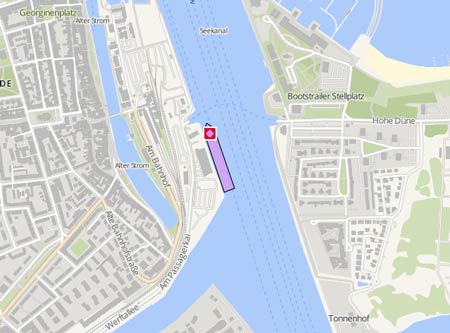AMUNDSEN
Kurs/Position
vor 3 Min
Die letzten Häfen
Die letzten Wegpunkte
Die neuesten Nachrichten
Helicopter raised from the depth
The helicopter which crashed on Sep 9 killing was recovered on Sep 25 from the Arctic Ocean. A team made up of members of the Canadian Coast Guard's two research vessels CCGS "Amundsen" and CCGS "Henry Larsen" along with ArcticNet and the TSB had been been working to recover the helicopter since its discovery on Sep 23 afternoon. The wreckage was raised to the surface, where it was hoisted onto the deck of the "Amundsen" and then transferred to the "Larsen" which was taken it to Resolute, Nunavut. The wreckage will then go to a location where the TSB can conduct its full investigation. U of M scientist Klaus Hochheim died in the crash on a routine flight checking ice conditions ahead of the ship. Canadian Coast Guard pilot Daniel Dube and Amundsen commander Marc Thibault also died in the crash. Report with photo: http://www.winnipegfreepress.com/local/Team-recovers-helicopter-from-the-Arctic-Ocean-225344292.html
Lost chopper found in 450 metres water depth
The chopper of the "Amundsen" which crashed in the M'Clure Strait in Arctic waters has been found. But now it has to be recovered from the depths. After the accident, the "Amundsen" had returned to Resolute Bay, Nunavut, with the recovered bodies of the crew. It later returned to the scene to recover the chopper. A remote-operated vehicle found the helicopter on the ocean floor, in a depth of about 450 metres. The coast guard, ArcticNet and the TSB were working together to recover it. But ice and weather conditions were making that difficult. While the aim was to recover the helicopter as quickly as possible, ensuring the safety of the personnel and vessels involved in this operation was a first priority. In addition to the "Amundsen", which was operating the ROV, the Coastguard icebreaker "Henry Larsen" also was assisting with the operation being in charge of clearing ice. The ship will have to be quite stabilized in order to make a good recovery. If there would be too much ice around the ship they won't be able to lift up the wreckage through the ice, so they have to move the ice away in order to be able to lift up the wreckage. It was hoped the chopper would be recovered by the end of Sep 25. Once that was done, the helicopter was to be transported to a TSB lab to inspect all types of components, engines, transmission, blades and the wreckage itself to determine what happened.
Crash victims died of hypothermia
Three men who died when a Canadian Coast Guard helicopter plunged into the Arctic Ocean last week were not killed by the crash but died of hypothermia, according to a preliminary post-mortem. The results revealed the three men were not seriously injured in the crash. It was believed Marc Thibault, the commander of the "Amundsen", Daniel Dubé, the helicopter pilot, and Klaus Hochheim, a researcher studying sea ice, were in the water for an hour before rescuers pulled them out. All three were wearing survival suits. The helicopter, a Messerschmitt BO 105S, was doing a reconnaissance mission on the state of the ice in the area when it crashed in the McClure Strait, about 600 kilometres west of Resolute. The helicopter was just minutes away from the "Amundsen" when the ship lost radio contact. At first they were trying to call them back to see if they could reach them on the radio as well, so it was probably about an hour. Transportation Safety Board investigators were trying to retrieve the helicopter.
News schreiben

